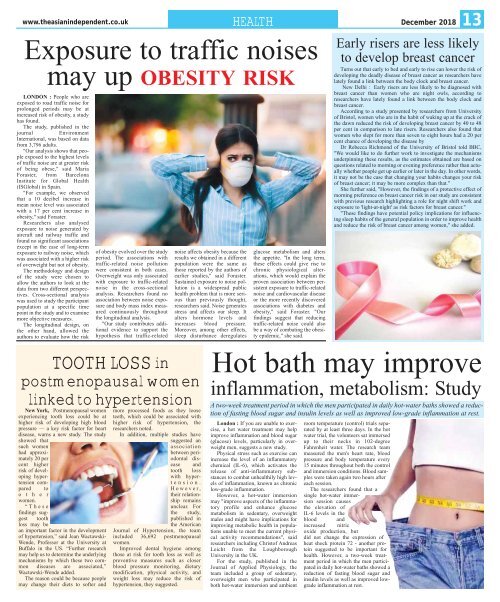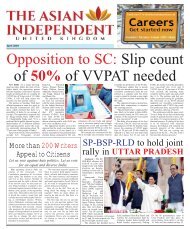December 2018
You also want an ePaper? Increase the reach of your titles
YUMPU automatically turns print PDFs into web optimized ePapers that Google loves.
www.theasianindependent.co.uk<br />
LONDON : People who are<br />
exposed to road traffic noise for<br />
prolonged periods may be at<br />
increased risk of obesity, a study<br />
has found.<br />
The study, published in the<br />
journal Environment<br />
International, was based on data<br />
from 3,796 adults.<br />
"Our analysis shows that people<br />
exposed to the highest levels<br />
of traffic noise are at greater risk<br />
of being obese," said Maria<br />
Foraster, from Barcelona<br />
Institute for Global Health<br />
(ISGlobal) in Spain.<br />
"For example, we observed<br />
that a 10 decibel increase in<br />
mean noise level was associated<br />
with a 17 per cent increase in<br />
obesity," said Foraster.<br />
Researchers also analysed<br />
exposure to noise generated by<br />
aircraft and railway traffic and<br />
found no significant associations<br />
except in the case of long-term<br />
exposure to railway noise, which<br />
was associated with a higher risk<br />
of overweight but not of obesity.<br />
The methodology and design<br />
of the study were chosen to<br />
allow the authors to look at the<br />
data from two different perspectives.<br />
Cross-sectional analysis<br />
was used to study the participant<br />
population at a specific time<br />
point in the study and to examine<br />
more objective measures.<br />
The longitudinal design, on<br />
the other hand, allowed the<br />
authors to evaluate how the risk<br />
of obesity evolved over the study<br />
period. The associations with<br />
traffic-related noise pollution<br />
were consistent in both cases.<br />
Overweight was only associated<br />
with exposure to traffic-related<br />
noise in the cross-sectional<br />
analysis. Researchers found no<br />
association between noise exposure<br />
and body mass index measured<br />
continuously throughout<br />
the longitudinal analysis.<br />
"Our study contributes additional<br />
evidence to support the<br />
hypothesis that traffic-related<br />
noise affects obesity because the<br />
results we obtained in a different<br />
population were the same as<br />
those reported by the authors of<br />
earlier studies," said Foraster.<br />
Sustained exposure to noise pollution<br />
is a widespread public<br />
health problem that is more serious<br />
than previously thought,<br />
researchers said. Noise generates<br />
stress and affects our sleep. It<br />
alters hormone levels and<br />
increases blood pressure.<br />
Moreover, among other effects,<br />
sleep disturbance deregulates<br />
HEALTH<br />
Exposure to traffic noises<br />
may up OBESITY RISK<br />
glucose metabolism and alters<br />
the appetite. "In the long term,<br />
these effects could give rise to<br />
chronic physiological alterations,<br />
which would explain the<br />
proven association between persistent<br />
exposure to traffic-related<br />
noise and cardiovascular disease<br />
or the more recently discovered<br />
associations with diabetes and<br />
obesity," said Foraster. "Our<br />
findings suggest that reducing<br />
traffic-related noise could also<br />
be a way of combating the obesity<br />
epidemic," she said.<br />
<strong>December</strong> <strong>2018</strong><br />
13<br />
Early risers are less likely<br />
to develop breast cancer<br />
Turns out that early to bed and early to rise can lower the risk of<br />
developing the deadly disease of breast cancer as researchers have<br />
lately found a link between the body clock and breast cancer.<br />
New Delhi : Early risers are less likely to be diagnosed with<br />
breast cancer than women who are night owls, according to<br />
researchers have lately found a link between the body clock and<br />
breast cancer.<br />
According to a study presented by researchers from University<br />
of Bristol, women who are in the habit of waking up at the crack of<br />
the dawn reduced the risk of developing breast cancer by 40 to 48<br />
per cent in comparison to late risers. Researchers also found that<br />
women who slept for more than seven to eight hours had a 20 per<br />
cent chance of developing the disease by<br />
Dr Rebecca Richmond of the University of Bristol told BBC,<br />
"We would like to do further work to investigate the mechanisms<br />
underpinning these results, as the estimates obtained are based on<br />
questions related to morning or evening preference rather than actually<br />
whether people get up earlier or later in the day. In other words,<br />
it may not be the case that changing your habits changes your risk<br />
of breast cancer; it may be more complex than that."<br />
She further said, "However, the findings of a protective effect of<br />
morning preference on breast cancer risk in our study are consistent<br />
with previous research highlighting a role for night shift work and<br />
exposure to 'light-at-night' as risk factors for breast cancer."<br />
"These findings have potential policy implications for influencing<br />
sleep habits of the general population in order to improve health<br />
and reduce the risk of breast cancer among women," she added.<br />
TOOTH LOSS in<br />
postmenopausal women<br />
linked to hypertension<br />
New York, Postmenopausal women<br />
experiencing tooth loss could be at<br />
higher risk of developing high blood<br />
pressure — a key risk factor for heart<br />
disease, warns a new study. The study<br />
showed that<br />
such women<br />
had approximately<br />
20 per<br />
cent higher<br />
risk of developing<br />
hypertension<br />
compared<br />
to<br />
o t h e r<br />
women.<br />
“These<br />
findings suggest<br />
tooth<br />
loss may be<br />
an important factor in the development<br />
of hypertension,” said Jean Wactawski-<br />
Wende, Professor at the University at<br />
Buffalo in the US. “Further research<br />
may help us to determine the underlying<br />
mechanisms by which these two common<br />
diseases are associated,”<br />
Wactawski-Wende added.<br />
The reason could be because people<br />
may change their diets to softer and<br />
more processed foods as they loose<br />
teeth, which could be associated with<br />
higher risk of hypertension, the<br />
researchers noted.<br />
In addition, multiple studies have<br />
suggested an<br />
association<br />
between periodontal<br />
disease<br />
and<br />
tooth loss<br />
with hypertension.<br />
However,<br />
their relationship<br />
remains<br />
unclear. For<br />
the study,<br />
published in<br />
the American<br />
Journal of Hypertension, the team<br />
included 36,692 postmenopausal<br />
women.<br />
Improved dental hygiene among<br />
those at risk for tooth loss as well as<br />
preventive measures such as closer<br />
blood pressure monitoring, dietary<br />
modification, physical activity, and<br />
weight loss may reduce the risk of<br />
hypertension, they suggested.<br />
Hot bath may improve<br />
inflammation, metabolism: Study<br />
A two-week treatment period in which the men participated in daily hot-water baths showed a reduction<br />
of fasting blood sugar and insulin levels as well as improved low-grade inflammation at rest.<br />
London : If you are unable to exercise,<br />
a hot water treatment may help<br />
improve inflammation and blood sugar<br />
(glucose) levels, particularly in overweight<br />
men, suggests a new study.<br />
Physical stress such as exercise can<br />
increase the level of an inflammatory<br />
chemical (IL-6), which activates the<br />
release of anti-inflammatory substances<br />
to combat unhealthily high levels<br />
of inflammation, known as chronic<br />
low-grade inflammation.<br />
However, a hot-water immersion<br />
may "improve aspects of the inflammatory<br />
profile and enhance glucose<br />
metabolism in sedentary, overweight<br />
males and might have implications for<br />
improving metabolic health in populations<br />
unable to meet the current physical<br />
activity recommendations", said<br />
researchers including Christof Andreas<br />
Leicht from the Loughborough<br />
University in the UK.<br />
For the study, published in the<br />
Journal of Applied Physiology, the<br />
team included a group of sedentary,<br />
overweight men who participated in<br />
both hot-water immersion and ambient<br />
room temperature (control) trials separated<br />
by at least three days. In the hot<br />
water trial, the volunteers sat immersed<br />
up to their necks in 102-degree<br />
Fahrenheit water. The research team<br />
measured the men's heart rate, blood<br />
pressure and body temperature every<br />
15 minutes throughout both the control<br />
and immersion conditions. Blood samples<br />
were taken again two hours after<br />
each session.<br />
The researchers found that a<br />
single hot-water immersion<br />
session causes<br />
the elevation of<br />
IL-6 levels in the<br />
blood and<br />
increased nitric<br />
oxide production, but<br />
did not change the expression of<br />
heat shock protein 72 - another protein<br />
suggested to be important for<br />
health. However, a two-week treatment<br />
period in which the men participated<br />
in daily hot-water baths showed a<br />
reduction of fasting blood sugar and<br />
insulin levels as well as improved lowgrade<br />
inflammation at rest.
















